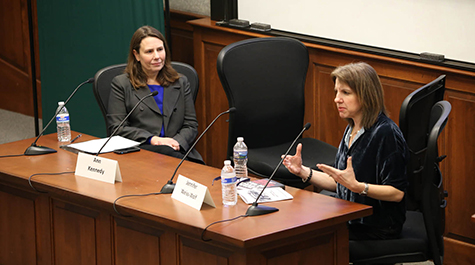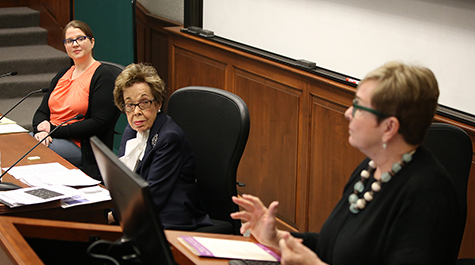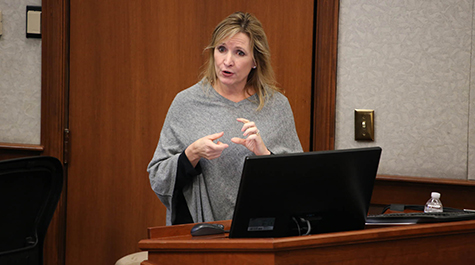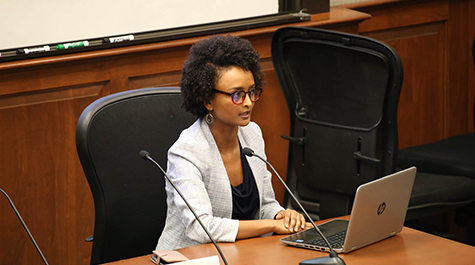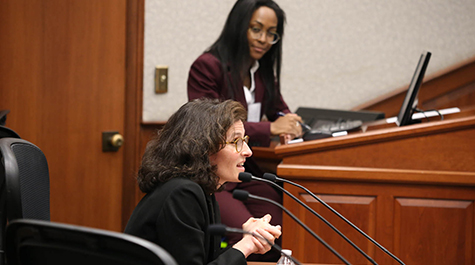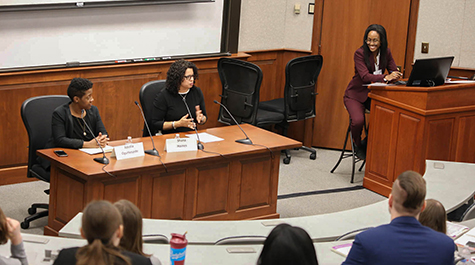Journal of Race, Gender, and Social Justice Holds Symposium on Power and Identity Politics
The William & Mary Journal of Race, Gender, and Social Justice held its annual Symposium on Friday, February 8 on “Power and Identity Politics: The Intersections of Marginalization and Social, Economic, and Political Ascension.” The Symposium focused on what identity people subscribe with and how they challenge the status quo when rights are infringed upon, causing societal repercussions.
The Symposium began with panelists Jennifer Weiss-Wolf and Ann Kennedy discussing gender and the effects of identity politics on women. Weiss-Wolf is the Vice President of the Brennan Center for Justice at New York University Law School and the school’s inaugural Women and Democracy Fellow. Her writing has been featured in The New York Times, Washington Post, TIME, and NPR, among others. She earned her A.B. from Lafayette College and her J.D. from Benjamin N. Cardozo School of Law.
During the Symposium, Weiss-Wolf spoke about how menstruation has been left out of the discussion of women’s rights in policy-making. She explained that only recently have women been able to gain momentum on this issue by enacting policies against the “tampon tax,” which placed a sales tax on menstrual products.
“There’s an under-acknowledgment of women’s own voices about their own bodies and needs,” Weiss-Wolf said. “Menstruation offers an oddly neutral and powerful platform to speak about our bodies.”
Ann Kennedy also spoke during this panel. Kennedy is a Professor of Women’s and Gender Studies and First-Year Composition at the University of Maine-Farmington. Her most recent book is Historicizing Post-Discourses: Postfeminism and Postracialism in United States Culture. She is currently working on a manuscript that studies the work of feminist performers whose work disrupts societal norms. She spoke about reproductive justice in forced sterilization cases.
Jayne Barnard, a Professor Emerita at William & Mary Law School, introduced Sybil Shainwald, who earned her B.A. in history from William & Mary in 1948. She went on to earn her J.D. from New York Law School in 1976, thanks to the passage of Title IX banning sex discrimination in higher education. She had been denied admission at Columbia University Law School on the basis of her age and gender in 1962. As an attorney, she was instrumental in extending the statute of limitations and securing compensation for women and their children who were injured while taking a medication during pregnancy to curb miscarriages, known as the “DES daughter” cases. The Journal of Race, Gender, and Social Justice dedicated its Special Issue to Shainwald for her legal work and advocacy.
“Few other social movements have addressed health care practice so directly,” Shainwald said of the women’s reproductive justice movement. “We have insisted on our rights to be educated about our bodies, to be partners in our healthcare, and to confront doctors.”
During this panel, Claire McKinney, an Assistant Professor of Government and Gender, Sexuality, and Women's Studies at William & Mary, spoke about the medicalization of women and the impact on legal and political markets. Her work has appeared in Politics, Groups and Identities and Disability Studies Quarterly and Hypatia and the Journal of Women, Politics, and Policy. She is currently working on a book about abortion politics and medicine.
The Symposium also featured presentations on different sociological perspectives on identity politics. Maereg Alemayehu, a legal analyst for the World Bank Group’s Women, Business and the Law Project, spoke about her work advocating for publicly funded legal aid for women facing civil litigation in Ethiopia.
William & Mary Law Professor Rebecca Green spoke about two major issues of election law that have major effects on racial justice, gerrymandering, and felon disenfranchisement. In addition to explaining the way election policies have been used to discriminate against racial minorities, she discussed her own work with the Revive My Vote project restoring voting rights to Virginians who have previously served time for a felony conviction.
The final presentation was given by a panel speaking about identity politics in the context of criminal justice reform. Professor Shana Haines, who teaches English at Tidewater Community College and a course on “Race, Law, and Literature” at William & Mary Law School, spoke about the history of black women in America who have used violence to resist systematic state oppression, from Harriet Tubman leading raids during the Civil War to Mabel Williams using a shotgun to turn away police officers attempting to disrupt a civil rights meeting in her home, among many others.
Adeola Ogunkeyede, the director of the Legal Aid Justice Center’s Civil Rights and Racial Justice Program in Richmond, VA, spoke about her work as a defense attorney and the important role of lawyers in recognizing and challenging systemic injustices in the criminal justice system.
“Too often the shorthand for guilt in a criminal case is race or poverty, and most times those being linked,” explained Ogunkeyede. “To the extent that is also a fact of history, and not happenstance, and not an individual circumstance particular to the millions of individuals who come through the criminal legal system in this country, my experience has always been to say, ‘Let’s talk about that.’”
The Symposium was presented by the William & Mary Journal of Race, Gender, and Social Justice, which publishes legal scholarship regarding gender, sexuality, race, nationality, and other topics relevant to social justice issues. The Journal (previously known as the William & Mary Journal of Women and the Law) recently released Issue 1 of Volume 25, its Special Issue, available online through William & Mary Law School’s Scholarship Repository.
About William & Mary Law School
Thomas Jefferson founded William & Mary Law School in 1779 to train leaders for the new nation. Now in its third century, America's oldest law school continues its historic mission of educating citizen lawyers who are prepared both to lead and to serve.
